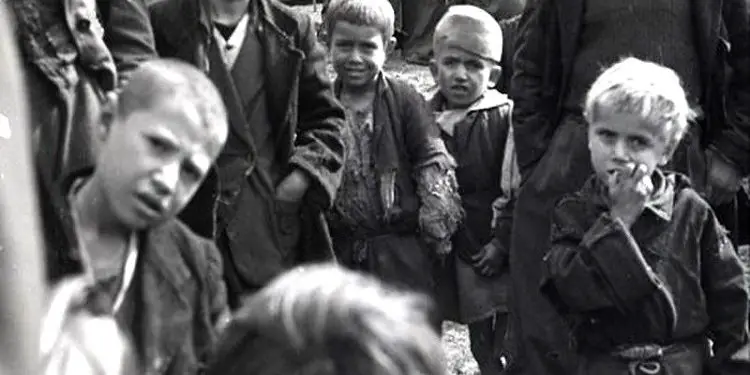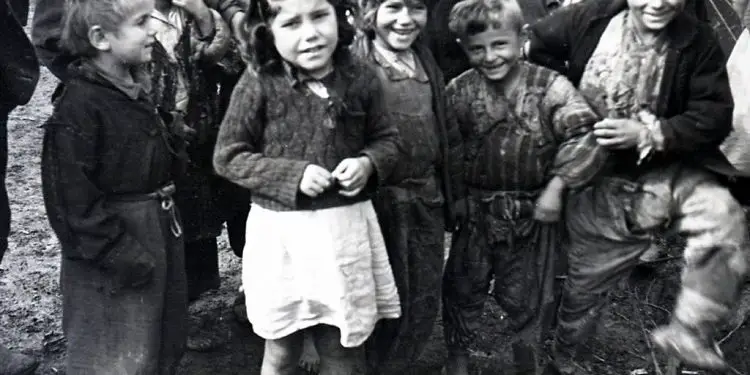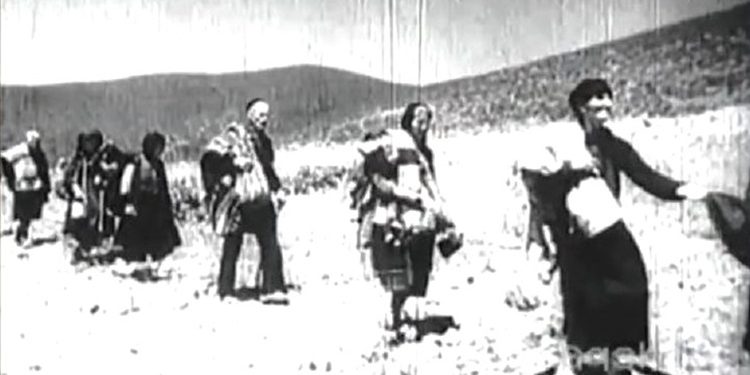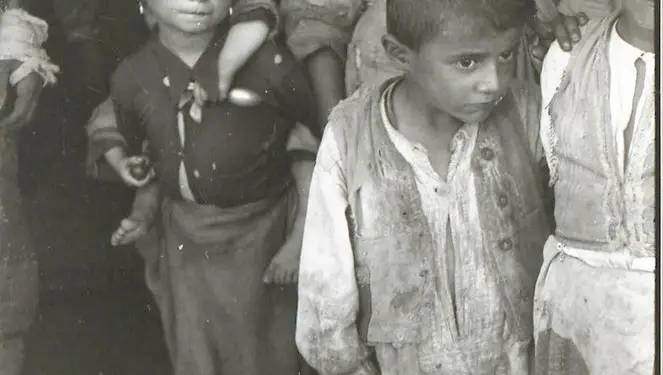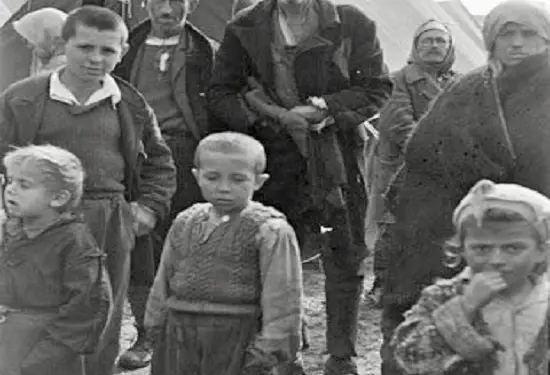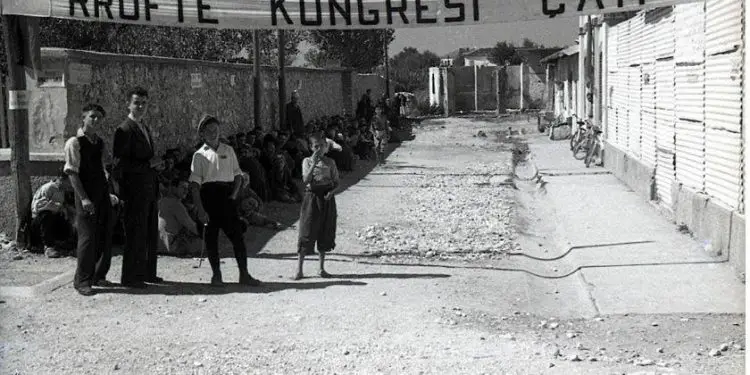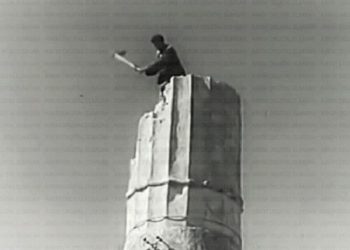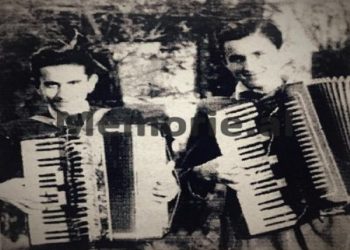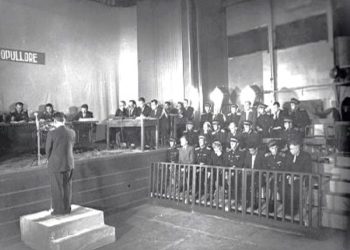By Isuf Bajrami
Part One
Memorie.al / “In the name of our population, we protest once again for all of this, we present to the UN Security Council Investigation Commission the tragedy played out in Chameria and we denounce a barbaric act committed with the aim of exterminating our population. We emphasize the need for a quick end to the Cham problem and we are convinced that our demands, which are…”! This was stated, among other things, in the memorandum of the Antifascist Committee of Cham Emigrants Living in Albania, sent to the Investigation Commission at the United Nations Security Council in 1947, signed by Taho Sejho, Kasem Demi, Rexhep Çami, Tahir Demi, Vehip Demi, Dervish Dojaka, Hilmi Seiti.
In continuation of our protests and demands addressed to the Great Allies and the United Nations, we demand justice for what we present….
MEMORANDUM
OF THE ANTI-FASCIST COMMITTEE OF CHAMA EMIGRANTS IN ALBANIA
TO THE U.N.O. SECURITY COUNCIL INVESTIGATIVE COMMISSION
ON THE TREATMENT AND MASSACRES OF THE ALBANIAN CHAMA MINORITY IN GREECE
We, the Anti-Fascist Committee of Cham Immigrants in Albania, with faith in the democratic and humanitarian principles of the U.N.O., in the name of the Cham immigrants in Albania, present before the Commission of Inquiry our lost rights, the oppressions, persecutions and massacres committed by the Greek fascists to exterminate the Albanian Minority in Greece. In continuation of our protests and demands addressed to the Great Allies and the United Nations, we demand justice for what we present:
The Greek chauvinist and reactionary clique, for 32 years in a row, brutally violating every human principle and disregarding even the slightest international treaties, have used a policy of extermination against the Albanian minority in Greece. Since the Greek invasion of Chameria on February 23, 1913, the gang of Deli Janaq, encouraged and supported by the authorities of the country, massacred without the slightest reason 72 men from the Paramitia region, on the Selam peninsula. These massacres were the beginning of the extermination of the Albanian minority and reveal the orientation that Greek policy took towards our population.
The pursuits, persecutions, imprisonments, internments, tortures, lootings and robberies under the pretext of disarmament during the years 1914-1921, the terrorist activity of the comitaxhins, the provocation in 1921 by General Bairas, all of these show the reality of the miseries in which our population was placed during the time of the Greek occupation. Koska, Lopsi, Varfanji, Karbunari, Kardhiqi, Paramithia, Margëllëçi, Arpica, Grykohori, etc., are some of the villages that have paid the most dearly for this terror.
In 1922-1923, the Greek rulers decided to implement the displacement of the Muslim element of Chameria (judging them as Turks), in exchange for the Greeks of Asia Minor (judging them according to religion). This shameful act of the Athens government was met with our resistance and the intervention of the League of Nations, which, recognizing the Albanian nationality of our population, rejected the decision of the Greek government.
But despite the intervention of the League of Nations and the solemn commitments made by the Greek government in Lausanne on January 16, 1923, the people of Athens continued their policy of extermination. They used every means to make it difficult for the Albanian element to stay in Chameria, expropriated hundreds of families on 6000 ha. of land, without the slightest compensation, as in Dushk, Gumenicë, Kardhiq, Karbunar, etc.
The Athens government settled emigrants from Asia Minor in Chameria, in order to populate it with Greeks and create the possibility of emigration of the autochthonous Albanian population. Entire families were forced to leave their homeland for Turkey, Albania, America and elsewhere, and villages like Petrovci and Shëndëlinja were completely abandoned by their Albanian inhabitants.
In these circumstances, we did not enjoy any national rights and our native language was still being suppressed; instead of developing national culture and progress, fanaticism and ignorance were supported; instead of schools, religious clubs in the Arabic language were opened and supported, while 95% of our population still remained illiterate.
The province of Chameria, a rich and prosperous country, had been left behind without economic development, without communication and in the hands of usurers, land grabbers like Koqoni, Pitulejt, Kufalla, Zhulla, Ringa, etc., who impoverished and enslaved the entire country.
In the war against fascism and precisely at its end, the reactionary Monarcho-Fascist forces of Llaka e Suli, created by the reaction and in the service of the invaders, under the Command of General Napoleon Zerva, treacherously attacked and massacred the Muslim Albanian inhabitants of Chameria.
At this time when the ELAS and our troops were fighting against the Germans, the EOEA command, in compromise with the Germans, operated to gain positions for the fratricidal war; and when our forces loyal to the spirit and decisions of the Caserta agreement (Sarafis-Zerva) of August 1924, were implementing the orders of the Joint Command in pursuit of the Germans, General Napoleon Zerva, commander of the resistance forces in Epirus (ELAS – EOEA), was simultaneously ordering operations and massacres at the expense of the innocent population of Chameria.
The massacres in Chameria are a flagrant violation of human principles and a shameful disregard for the principles and character of the anti-fascist war. The massacres in Chameria were carried out thanks to the collaboration and agreements with the Germans, who in retreat gave way to the Zerviste forces.
Here is a concrete fact of the cooperation between the Zerviste forces and the German ones: The Zerviste Commander Theodhor Vito, of the forces of the Filat region, one day before the Zerviste forces entered Filat and precisely on September 22, 1944 in the village of Fanaromen, 3 km from Filiat, met with the Commander of the retreating German forces.
After this meeting we see that even before the German forces had left Filat, Theodhor Vito’s forces entered Filat. Thus, such cooperation provided the Zerviste forces with wings, giving them the opportunity to start terror and massacres on a wide scale in all the provinces of Chameria.
The forces of the X Division of the EOEA, under the command of Colonel Vasil Kamara and precisely those of the XIV Regiment of this Division led by Kranja, with the assistance of Lefter Strugar, lawyer Stavropoulos, Ballumi, Zoto, the notorious criminals Pantazej, etc., on June 27, 1944, entered the city of Paramithis.
Contrary to the promises given and the agreement made between Mufti Hasan Abdullaj on the one hand and Shapera with the Despot of Paramithis on the other hand, as agents of Zerva, the vilest massacres began. Unprotected men, women and children were the target of the Greek Monarcho-Fascists. The number of those massacred in the City of Paramithis and the surrounding area reached 600 people. On July 28, 1944, the forces of the 40th Regiment under the Command of Agora entered Parg, where they massacred 52 men, women and children.
The EOEA forces under the command of Theodhor Vitos, Ilia Kaços, Hristo Mavrudi, Hristo Kaços, Hari Dhiamanti, etc., after surrounding the city of Filiat on September 23, 1944, on Saturday morning, entered the city. On the same day, they also entered Spatar, looting and plundering all the families and everything they found. On the evening of the 23rd, at dawn on September 24, 1944, the forces commanded by Kranjaj, Strugar and others also entered; upon the arrival of these forces, the massacres immediately began.
47 men, women and children were massacred in Filat and 157 are counted among the massacred, killed and missing in Spatar, where a good part of them had been gathered from other villages. All the young women and girls were abused and disgraced by the criminals of Zerva.
A few days later, the monarcho-fascists gathered all the remaining men and with the decision of the mock trial, Koqinja Chairman, Stavropoulos Prosecutor and four members, 47 innocent Albanians were massacred. In Granicë of Filiat, the bodies of 46 people were covered and stabbed, and 45 others in the field of Filat, in the field of Xhelo Metos.
Entire families disappeared with parents, children and babies in their cradles. Women and girls were dishonored. With hundreds of statements from those who survived describing the murders and suffering they suffered, the criminality and purpose of the actions of the monarcho-fascists in Chameria becomes clear.
Here are some examples: Sanije Bollati in Paramithi was burned with gasoline after her breasts were cut off and her eyes gouged out. Ymer Murat was killed and cut into pieces in Paramithi. More than 40 women had gathered in Sulo Tar’s house and Çili Popova from Popova, dressed in military uniform, entered with a group of soldiers, took the most beautiful women and girls and began to humiliate them in another room.
The screams of the girls and women reached their peak. This atrocity continued all night. Seri Fejzo, Fizret Sulo Tare, etc. were the objects of these atrocities. Hilmi Beqiri from Filati, after being wounded in front of his family, was left and fled.
The family, to make sure, sheltered him with the dentist Mavrudhiu, who kept him for a few hours, but later announced that they would take him and take him to Stavro Muhaxhiri, while he himself left for Shuaip Metja where many families had gathered. The Andarts were informed, took him, first they pulled out his gold teeth with forceps and then they killed him.
Malo Muhon, an 80-year-old man who had been ill for four years, was killed with axes in front of his wife. His brains were blown out in his wife’s lap, who, after collecting them, covered them with a blanket and fled. In Spatar, Abdul Nurçe was taken to Filat barefoot, dragged through the streets of the city and finally killed in front of Nidh Tafeqi’s house. Lile Rustemi’s family from Shulash, consisting of 16 people, mostly children, disappeared completely without a single one surviving.
Xhelal Mini from Paramithija was beheaded with bayonets on the body of Mufti Hasan Abdullau. Sali Muhdini, Abedin Bako, Muhamet Pronja and Malo Sejdiu had their fingers, noses, tongues and feet cut off, and when they screamed in great pain, the Zervist andarts sang the songs of their commander and rejoiced when they saw these horrors. Finally, they were killed on the butchers’ hooks.
Eshtref Himi, a citizen from Paramithi, states the following about the massacres in Paramithi: On Tuesday, June 27, 1944, at 7 am, the Greek monarcho-fascists, commanded by Colonel Kamara, Major Krasnja, Captain-at-Law Kristo Stavropoulli, Captain-at-Law Lefter Strugari, Lieutenant-Lieutenant Nikola Cenos, etc., entered Paramithi.
As soon as they entered the city, the order was given that no one should move from their place because honor, freedom and property would not be affected in any way. After lunch, arrests of women, men and children began immediately, while theft began.
All the men were killed by the next day. After being held in prison for 4 days, they released me to bury the dead. At the place called the Church of Aj Jorgjit, I was able to recognize 5 of the killed people; the others had become unrecognizable due to the torture they had suffered. The five victims I knew were: Met Qere, Sami, Asim, Mahmut Kupi, Adem Beqiri and Haki Mile.
After two days, they took me to “Galataj” near the house of Dhimitër Nikolla, where 8 people had been killed. I could not recognize them because they had been cut into pieces. There were human corpses everywhere. The one named Sanije Bollati, after suffering terrible torture, was burned alive with gasoline.
This tragedy took place on Wednesday and Friday morning, her body was transported covered in a blanket by her mother and two fellow citizens who placed her in a cellar by order of the monarcho-fascists who did not let anyone see her. There this poor woman died after five days and her corpse was full of worms.
I declare that I saw everything with my own eyes. At first I hid for five days in a row in a ceiling when the monarcho-fascists arrested me and presented me before Major Kranjaj who, after brief questioning, ordered my imprisonment.
In the prison I found 380 people, including women and children. 120 of these died of hunger. 4 people and I stayed in prison for 15 days and from there we were escorted to Preveza from where we went to Ioannina where we stayed for 40 days. There we suffered unspeakable tortures. Then, with the arrival of EAM troops in this city, we were freed. Memorie.al
To be continued in the next issue




